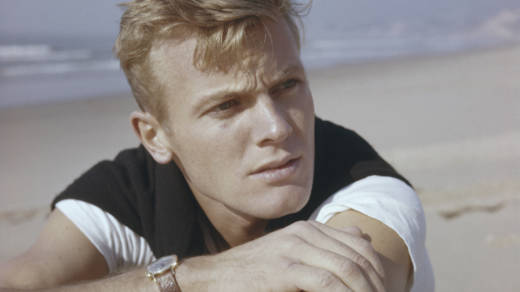He was wrong. He hadn't counted on the still-potent power of the Hollywood studio system (he'd been one of the very last actors to get signed to an exclusive Warner Bros. contract). Specifically, he'd underestimated studio president Jack Warner's ability to wage a spirited disinformation campaign.
Very public dates with a bevy of starlets/co-stars followed: Natalie Wood, Debbie Reynolds, french ingenue Etchika Choureau, and more. It was enough to distract the Hollywood press from his relationships with champion figure skater Ronnie Robertson ("A lot of [Tab's] friends were ice skaters," says one of his former co-stars, meaningfully) and, later — after meeting at the pool of the Chateau Marmont, of course — with fellow up-and-coming actor Anthony Perkins.
In the documentary, Hunter and many of the women he dated describe him at the time as a man deeply conflicted. Not about his sexuality — he knew who he was, and to whom he was attracted — but about his career. He resolved to simply never discuss his private life; he had signed a contract, and that meant dutifully adopting the persona the studio assigned to him. In public, anyway.
He seriously considered marrying Choureau, his co-star in 1958's Lafayette Escadrille, to silence the rumors once and for all. But Hunter, who'd been raised Catholic (though he had fallen away from the church as teenager), knew that would be wildly unfair to her — and to himself as well. Many of his fellow closeted actors suppressed such moral qualms and married, but Hunter wasn't prepared to make such compromises. "I felt that if you were with a man," he says, "you were sinning. [But] if you were with a woman, you'd be lying."
He left Warner Brothers soon after, and his film career faltered without the muscle — and rumor-quashing power — of Jack Warner behind him. His well-scrubbed image didn't fit the times of Easy Rider and Five Easy Pieces. For other actors, that might represent the end of the story. But in Schwarz' documentary, Hunter comes off as a man who made peace with himself in the wake of his huge popularity. He was content, he says, to find work when and where he could: television, dinner theater, hilariously shlocky c-movie horror fare like 1972's Sweet Kill.
Hunter returned to his Catholic faith — on his terms, as a gay man — around this time, and that, along with his lifelong love of horses and show jumping, seem to have engendered in him a sense of contentment. His agent urged him not accept a role in the 1981 John Waters film Polyester, in which his character falls hard for drag queen Divine. But watching that performance today, you see none of the watchful guardedness he possessed in the films of his studio heyday. Nor do you see any trace of the nervousness on display in kinescopes of his television appearances performing his chart-topping teeny-bopper hits like "Young Love."
No, the thing that strikes you is how utterly game he is, how unafraid — he's throwing himself into the performance, holding nothing back. Having fun.
So much fun that he took an active role in securing funding for the follow-up project Lust in the Dust (1985), which re-teamed him with Divine, let him ride all the horses he wanted, and introduced him to producer Allan Glaser, the man who would become his life-partner until Hunter's death Sunday.
The documentary Tab Hunter Confidential closes with Glaser expressing wonder at how completely at ease Hunter seems with the end of his Hollywood career. "He says it's his past life," Glaser says, and goes on to relate how, should Hunter ever be watching TV and see one of his old movies, he simply flips past it "like it's a dog food commercial."
The film's final shot, which on Sunday acquired a new, and moving, additional layer of meaning: An octogenarian Tab Hunter beaming as he rides his beloved horse Harlow away from the camera — and into the sunset.
Copyright 2018 NPR. To see more, visit http://www.npr.org/.9(MDAxOTAwOTE4MDEyMTkxMDAzNjczZDljZA004))

9(MDAxOTAwOTE4MDEyMTkxMDAzNjczZDljZA004))

